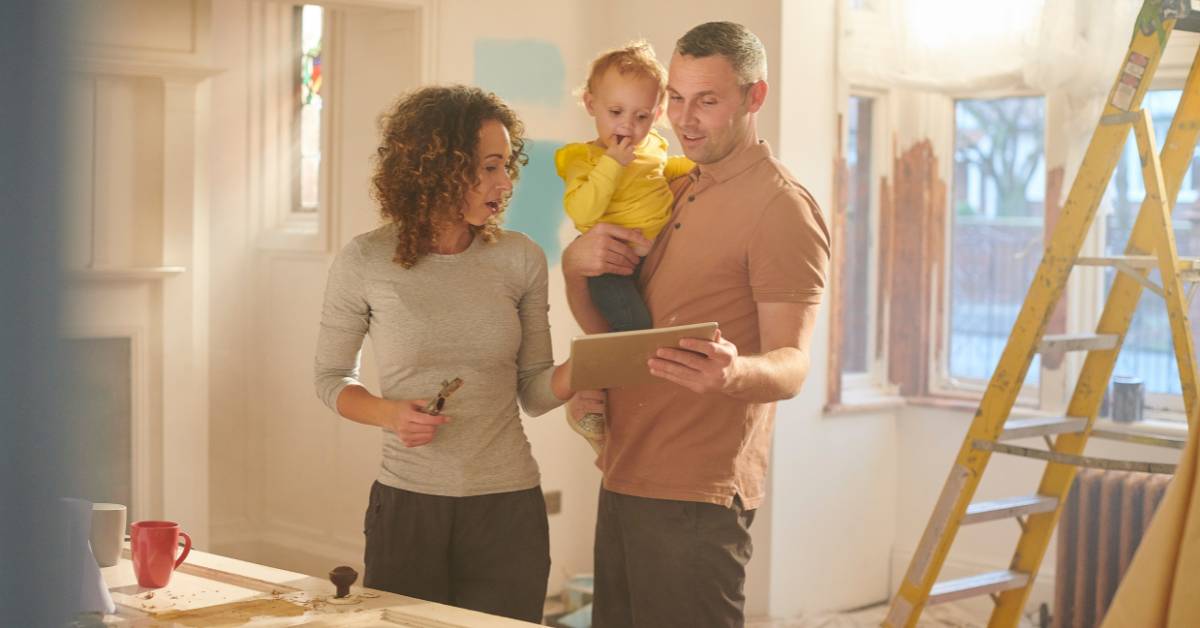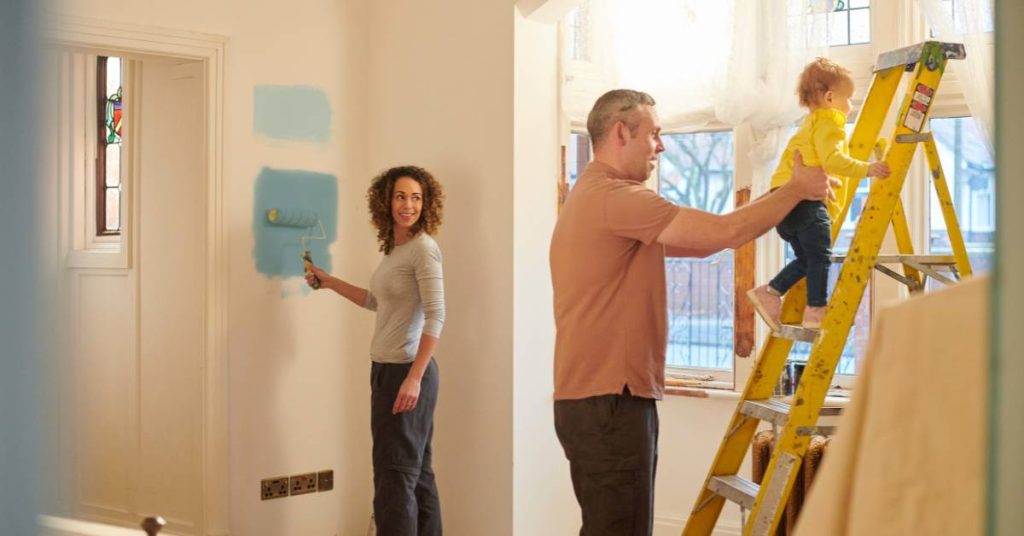Have you been dreaming of owning a fixer-upper home? Are you wondering if an FHA loan can help make your dreams a reality?
Luckily for you, with a 203(k) FHA loan, you can purchase and improve a fixer-upper home with one mortgage. It’s an amazing way to build equity and create the home of your dreams.
This article will give you all the information you need about this fixer-upper loan and will leave you with a blueprint on how to benefit from this exciting opportunity.
FHA Loan Overview
An FHA loan is a mortgage insured by the Federal Housing Administration. It offers more flexible loan requirements and allows borrowers to purchase a home with a lower down payment than traditional mortgages.
It’s a great option for those looking for more affordable housing options.
There are a couple of FHA loan types meant for different purposes. Here are just a few of them:
- Basic FHA mortgage 203(b) – This is by far the most popular FHA loan. It has fairly low credit and down payment requirements and offers competitive interest rates as compared to conventional mortgages.
- FHA 203(k) loan – Otherwise known as a rehab loan or renovation loan, the 203(k) loan allows you to combine the price of the property and the cost of renovations into one mortgage with one monthly payment.
- Energy-efficient mortgage – This loan covers not only the cost of the property, but also covers an additional ‘energy package’ that homeowners use to make their home more energy efficient.
- Home equity conversion mortgage – This is aimed at homeowners over the age of 62 who would like to give up some of their equity for cash.
You and your potential home’s needs, as well as your financial position, will determine which FHA loan option is best for you.
Is There An FHA Loan Available For Fixer Uppers?

Yes. The FHA 203(k) loan program offers a great option for those looking to buy and rehabilitate their dream home.
This program allows buyers to combine their mortgage and renovation costs into one loan, making the purchase of a fixer-upper more affordable and convenient.
This type of financing provides borrowers with many benefits, including limited down payment requirements, flexible credit qualifying criteria, and lower interest rates than other types of loans.
There are two kinds of 203(k) loans you can apply for.
1. Limited 203(k) loan (also known as a Streamline 203(k) loan)
This loan is meant for homes that do not require major or structural repairs. Some of the repairs that can be covered by this loan include:
- Cosmetic bathroom and kitchen remodel
- Carpeting or flooring
- Painting
- Energy-efficient home improvement
- Septic system improvements
- Appliance replacement
- And more
There is no minimum limit to the costs of these renovations but there is a maximum limit.
If you are looking to do nothing more than cosmetic repairs, this might be the better option for you.
2. Standard 203(k) loan
This loan is meant for major renovations. Some of the work that can be covered by this loan include:
- Structural alterations or repairs
- Convert single units into 2-4 units
- Full bathroom and kitchen remodels
- Major landscaping projects
- Constructing additions
- Renovations requiring architectural drawings
- Making a home accessible for a disabled person
- And more
To qualify for this loan, the renovation costs must be at least $5,000.
There is no official maximum limit for renovation costs but the FHA does have loan limits that vary depending on the value of your home and the county your property is in. Check your county’s loan limit here.
So if you want to use an FHA loan to buy a fixer-upper, the 203(k) loan is the loan to pursue.
Benefits Of Buying A Fixer-Upper Home With an FHA Loan

Buying a fixer-upper with an FHA 203(k) loan has many benefits that make it the better choice when compared to other loan options.
Here are 3 benefits of buying a fixer-upper with an FHA 203(k) loan.
Cheaper
FHA loans offer competitive rates and generally lower down payment requirements than conventional loans. Additionally, with this loan, you can roll your closing costs into the loan. This ultimately means that you will need a lot less money upfront to secure the loan as compared to conventional loans.
Because the 203(k) loan also allows you to combine the purchase of your home and the costs of the renovations into one loan, you also save on the costs of having to secure two separate loans for the two purposes.
More accessible
FHA loans were created to make homeownership more accessible for people who would not generally qualify for a conventional loan. Because of this, FHA loan requirements are generally a lot more flexible than requirements for traditional loans.
So even if you do not have the best credit or a lot of money saved up for a down deposit, you may still be able to take advantage of FHA’s flexible credit requirements, down payment requirements, and competitive rates, and secure yourself an FHA loan.
More convenient
One of the biggest benefits of a 203(k) loan is the fact that you can combine the cost of the house and the renovations into one loan.
Not only does this save time in the application process, but it gives you the convenience of having to pay only one loan payment a month as opposed to two.
Can You Add Renovation Costs To FHA Mortgage?
Yes, you can add renovation costs to an FHA mortgage.
The FHA 203(k) loan program allows home buyers to purchase a fixer-upper and finance the cost of making repairs and improvements in one loan.
You’ll still need to cover the cost of a minimum down payment, but then you can borrow up to 110% of what the property is worth after repairs are made. This means that if you buy a house for $200,000 and the estimated cost of repairs is $20,000, you can borrow up to $220,000 with just one loan.
FHA Loan Home Improvement Requirements
As with any loan, certain requirements must be met for your property to qualify.
Take a look at this table to understand the 203(k) loan requirements concerning your property and the renovations.
FHA 203k Loan Requirements
Property requirements:
- Must be used as homeowner’s primary residence
- Homeowner must live at the home for at least 12 months before renting or selling
- Can be a single-family dwelling or multi-family dwelling
- Must not be a mixed-use property (residential and commercial)
- 1-4 unit family home must have been completed for at least a year
- You can tear down and rebuild as long as the foundation remains intact
Renovation Requirements
- Renovations must be complete within 6 months
- Luxury renovations (e.g. swimming pools, tennis courts) cannot be included
- Must hire a HUD-approved consultant for standard 203k loan renovations Find an approved consultant here
- All renovations must be done by a licensed contractor
- No DIY work without lender’s approval
- Planning must be done before loan approval
- Renovations must begin within 30 days of closing
- All renovations must be up to code
Loan Limits
- Limited 203k loan – Renovation costs maximum is $35,000
- Standard 203k loan – No official renovation costs maximum. Maximum is determined by the value of the property and the county the property is in.
How Are FHA Home Improvement Loans Disbursed?
Home improvement loans are disbursed in various ways, depending on the loan type.
Here’s a quick look at the most common types of home improvement loans for a fixer-upper and how they are disbursed:
1. FHA 203(k) Limited Loan: These loans do not require an appraisal or home inspection. The loan amount is based on the value of your home after repairs and renovations are completed. The lender will release funds to you in installments as the work is completed.
2. FHA 203(k) Standard Loan: These loans provide financing for more extensive renovations that cost more than $35,000. Funds for these loans will be released in three stages – after the initial loan closing and when certain milestones in construction have been met (such as completion of rough framing).
Should I Use an FHA Loan to Buy a Fixer-Upper?

There are many advantages to using an FHA loan to buy a fixer-upper home. The 203(k) loan option allows for additional flexibility and can make flipping houses much easier than traditional loans.
However, it is important to be aware of all the requirements before applying for such a loan and consult with a local lender who understands all aspects of financing a fixer-upper purchase.
By taking advantage of this unique FHA loan program, buyers can turn their dreams into reality – transforming an older property into the perfect home without having to break the bank in the process.
Frequently Asked Questions
Can you add repair costs to FHA loans?
Yes. If you apply for an FHA 203(k) loan, you will be able to use it to pay for both the price of the home and the cost of necessary repairs or renovations.
You can also explore the FHA Title 1 loan option. This is meant for homeowners who are already living in their homes and would like a loan to make repairs and improvements that would make the home more liveable and useful.
What type of loan can you get for a fixer-upper?
If you are looking for an FHA loan for a fixer-upper, the 203(k) loan is your best option. It allows you to combine the price of a home and its renovations into one loan, while offering flexible requirements and competitive rates.
If you choose other FHA loans or conventional loans, you may need to get one loan for the home and a separate loan for renovations.
Can you use an FHA loan to flip a house?
Yes and No.
FHA loans were meant for homeowners purchasing homes that would serve as their primary residences. They are not meant to be a financing option for flipping homes.
But it is still possible to flip a house using an FHA loan.
There are, however, certain restrictions that you should be aware of before deciding to flip a home using an FHA loan. For example, you must occupy the property within 60 days after closing and hold it for at least one year afterward before selling it.
If you are willing to live in the property for one year, you can then sell it for a higher value.
How hard is it to get a 203(k) loan?
Getting a 203(k) loan can be difficult. It requires a bit more work than a traditional mortgage loan, so it’s important to understand what you’re getting into.
Here are some of the requirements you’ll need to meet:
- You must have credit above 500 to qualify for a 203(k) loan.
- You must have sufficient income to make your monthly payments.
- You must provide documentation of any repairs or renovations you plan to make on your property before the loan will be approved.
Get in touch with us for more information or assistance.
What is the maximum amount for a 203(k) loan?
The maximum amount for a 203(k) loan is based on the lesser of two values: either 110% of the property’s after-improvement value or the total cost of needed repairs plus the purchase price.
For a 203(k) limited loan, the renovation costs cannot exceed $35,000.
Is it possible to get a mortgage for a fixer-upper?
Yes. The FHA 203(k) loan is available for homeowners who would like to get a mortgage for their fixer-uppers. It offers convenience, flexible requirements, and competitive rates.
Can I refinance into a 203(k) loan?
Yes. Refinancing an FHA loan is a popular option for many homeowners. If you want to do renovations on your home, you can refinance your mortgage and include your renovation costs in a new 203(k) loan.






